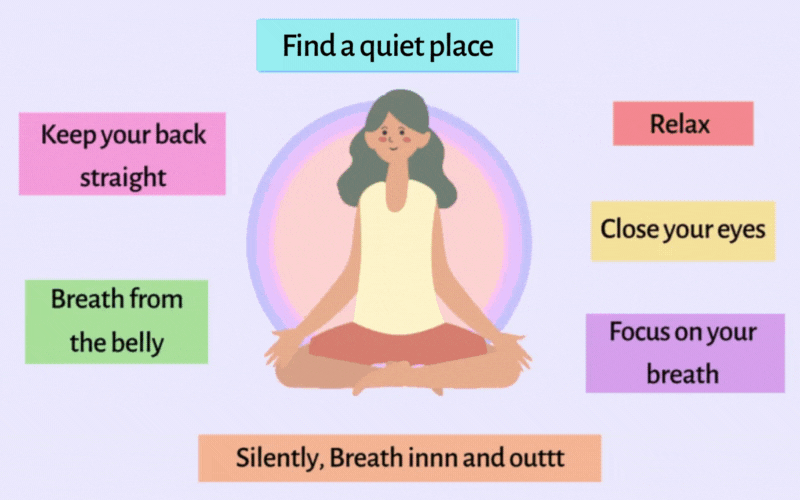Introduction:
Meditation is a practice that has been around for thousands of years and has been used to promote physical, mental, and emotional well-being. It is a simple yet powerful tool that can help you reduce stress, improve focus, and cultivate a sense of inner peace.
What is Meditation?

Meditation is a method to rest deeply and stay aware and awake at the same time! It’s a skill that helps calm the mind and connect with the happiness inside you. Meditation is like a gentle art of doing nothing and releasing all efforts to find relaxation in your true self, which is filled with love, joy, and peace. Practicing meditation provides a profound sense of rest. It’s important for reducing stress and keeping your mind healthy.
Origin Of Meditation:
Meditation has been practiced for thousands of years by cultures all around the world. The origins of meditation are somewhat difficult to trace, but it is believed to have originated in ancient India, where it was practiced as part of the Hindu and Buddhist religions.
The earliest written records of meditation date back to around 1500 BCE, when the Vedas, a collection of Hindu scriptures, were written. These texts describe meditation as a way to connect with the divine and achieve a state of enlightenment.
Over time, meditation spread to other parts of the world, including China, Japan, and Tibet. Each culture developed its own unique style of meditation, but the basic principles remained the same: focus on the breath, quiet the mind, and achieve a state of inner peace.
Today, meditation is practiced by millions of people around the world, both as a spiritual practice and as a way to reduce stress and improve overall well-being. Whether you’re a beginner or an experienced meditator, there’s no denying the power of this ancient practice to help you connect with yourself and the world around you.
Benefits:
Studies have shown that meditation can have a number of benefits for both your mind and body. Major benefits are mentioned below:
1. Reduced stress and anxiety
2. Improved focus and concentration
3. Increased feelings of calm and inner peace
4. Improved sleep quality
5. Reduced symptoms of depression
6. Lowered blood pressure and reduced risk of heart disease
7. Boosted immune system function
8. Reduced inflammation in the body
9. Improved emotional well-being and self-awareness
10. Increased feelings of compassion and empathy.
Meditation for beginners:

If you’re new to meditation and want to give it a try, here are some tips to get you started:
Find a quiet and comfy spot: Look for a place where you can sit or lie down comfortably without distractions.
Start with a short time: Begin with just 5-10 minutes of meditation. You can use a timer to keep track.
Focus on your breath: Pay attention to your breath and feel the air going in and out of your nose or mouth. It helps to anchor your attention.
Handle wandering thoughts: Your mind will wander, and that’s okay! When you notice your thoughts drifting away, gently bring your focus back to your breath.
No judgment, just observation: Don’t be hard on yourself or your thoughts. Just observe them without getting attached to them or judging them as good or bad .
Establish a routine: Try to meditate at the same time every day. This will help make it a regular habit.
Be patient: Remember that meditation is a skill, and it takes time to get better at it. Be patient with yourself and enjoy the process.
Keep in mind that there’s no right or wrong way to meditate. The important thing is to show up and practice regularly. Over time, you’ll develop the ability to meditate effectively and experience the many benefits it offers.
Relationship between Meditation and Spirituality
Meditation is a valuable tool for personal and spiritual growth. It offers an opportunity to connect with our inner selves and gain a deeper understanding of the world around us. Many individuals find that through meditation, they experience a sense of connection to a higher power or spiritual force.
Spirituality is a unique journey for each individual, and meditation can serve as a pathway to explore and deepen that journey. By quieting the mind and focusing on the present moment, we can cultivate a heightened awareness and develop a clearer understanding of our place in the world.
For some, meditation is a means to connect with specific spiritual practices or traditions, such as Buddhism or Hinduism. Others view it as a more general tool for self-reflection and personal growth.
Irrespective of our beliefs or background, meditation has the potential to profoundly impact our spirituality and strengthen our connection with ourselves and the world around us. Integrating meditation into our daily routines allows us to embark on this transformative journey and witness its benefits firsthand.